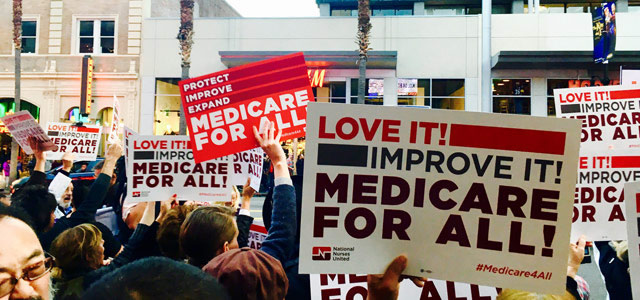

Share
A strong endorsement of government-run, single-payer Medicare for All as the ultimate solution to U.S. health care ills highlighted position statements from the summer AFL-CIO Executive Council meeting.
The council’s health care statement, issued from the three-day meeting in late July in Silver Spring, Md., first denounced Congressional Republicans for trashing the Affordable Care Act.
“If Congress and President Trump are truly interested in improving health care for working people, there are many things they could do,” the fed’s statement said, near the end.
Those Affordable Care Act fixes include tackling “hollowed-out coverage with deductibles that are far too high for the typical person,” reining in prescription drug prices, and repeal of the “Cadillac Tax” on high-cost health plans, many of which unions have negotiated in contracts.
Lawmakers should also explore patient-centered alternatives to the private insurance system – with single-payer Medicare for All topping the list, the statement adds.
“Our core goal is to move expeditiously toward a single-payer system, like Medicare for All, that retains a role for workers’ health plans and in which access to quality, affordable health care is indeed a right for everyone in this country,” it declares.
Even as the council blasted the GOP maneuvering to repeal the ACA, that effort went down in flames in the U.S. Senate. Three Republicans – Arizona’s John McCain, Alaska’s Lisa Murkowski and Maine’s Susan Collins – listened to their constituents and defied the party line by opposing all versions of the so-called ACA “replacement” bill. Together with all 46 Democrats and both independents, their three votes were enough to sink the legislation. The other 49 Republicans voted for it.
Endorsement of single-payer government-run health care as the ultimate goal of the labor movement marked a new phase in labor’s crusade to reform the U.S. health care system.
At least 20 unions, led by National Nurses United, the United Steelworkers and the Amalgamated Transit Union, have campaigned for single-payer for years. The AFL-CIO endorsed it as a potential objective in prior health care statements.
In past years, though, Congress — and even its Democrats — turned a deaf ear to calls for single-payer. Former Rep. Dennis Kucinich, D-Ohio, pushed a single-payer option through one committee during construction of the ACA, but his plan was later dropped.
And in California, a strong NNU push for single-payer in the nation’s largest state, through State Senate passage of SB562 establishing it, has been stymied by the Democratic State Assembly speaker. In addition, Gov. Jerry Brown, D-Calif., questions how the state would pay for it.
But now the federation apparently wants to revive the drive. And it may be gaining public support, as a contributor to USW’s blog notes that a recent opinion poll shows 53 percent of the public back single-payer. Sen. Jeff Merkley, D-Ore., recently reported that even his Republican constituents were asking him about – and backing – single-payer.
The fed’s other Executive Council statements:
- Denounced the Trump administration’s rollback of government regulations — including dumping of the rule requiring fuller disclosure from union-busters.
- Reiterated pro-worker goals for negotiating a “new NAFTA.”
- Blasted the denial of voting rights through so-called Voter ID laws and said the stacked “election fraud” commission Trump named is probing a problem that doesn’t exist.
- Defended the rights of undocumented people, including more than 1 million covered under the Obama administration’s program for protecting teenagers and young adults brought to the U.S. as children, and other workers under “Temporary Protected Status.”

